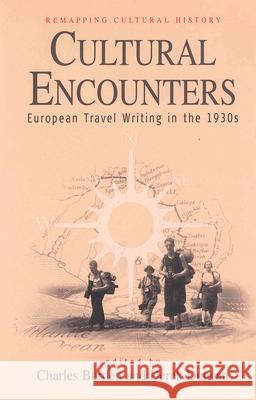Cultural Encounters: European Travel Writing in the 1930s » książka
Cultural Encounters: European Travel Writing in the 1930s
ISBN-13: 9781571818102 / Angielski / Twarda / 2002 / 224 str.
"These timely reconsiderations of European Travel writing from the 1930s reassert the oppositional primacy of subjective translations and disavow hermetic notions that travel should or even can be divorced from socio-political or cultural contexts." - Journeys "Cultural Encounters offers a rich, varied and yet impressively coherent collection of essays on the meanings and practices of travel writing in 1930s Europe. Carefully building on theoretical interest in travel writing of recent years, the essays follow written journeys to Graham Greene's Liberia and Lorca's Cuba, to Fascist Italy's Greece and France's Indochina, and many more. Throughout, texts and authors are shown to be alive with hybrid constructions of self and of ideological, national and colonial identity. What is more, the book provides compelling reasons for seeing 1930s travel writing as being of particular fascination, lying on a cusp between the Depression, totalitarianism, colonialism and modernism, and the seeds of mass tourism, post-colonialism and globalization." - Re-reading German literature since 1945, Robert Gordon, Cambridge University The 1930s were one of the most important decades in defining the history of the twentieth century. It saw the rise of right-wing nationalism, the challenge to established democracies and the full force of imperialist aggression. Cultural Encounters makes an important contribution to our understanding of the ideological and cultural forces which were active in defining notions of national identity in the 1930s. By examining the work of writers and journalists from a range of European countries who used the medium of travel writing to articulate perceptions of their own and other cultures, the book gives a comprehensive account of the complex intellectual climate of the 1930s. Charles Burdett is lecturer in Italian at the University of Bristol and co-editor of European Memories of the Second World War (1999). He is currently working on representations of Africa in fascist Italy. Derek Duncan is lecturer in Italian at the University of Bristol. He has published extensively on twentieth century Italian literature with particular reference to questions of gender and sexuality.
"These timely reconsiderations of European Travel writing from the 1930s reassert the oppositional primacy of subjective translations and disavow hermetic notions that travel should or even can be divorced from socio-political or cultural contexts." · Journeys "Cultural Encounters offers a rich, varied and yet impressively coherent collection of essays on the meanings and practices of travel writing in 1930s Europe. Carefully building on theoretical interest in travel writing of recent years, the essays follow written journeys to Graham Greenes Liberia and Lorcas Cuba, to Fascist Italys Greece and Frances Indochina, and many more. Throughout, texts and authors are shown to be alive with hybrid constructions of self and of ideological, national and colonial identity. What is more, the book provides compelling reasons for seeing 1930s travel writing as being of particular fascination, lying on a cusp between the Depression, totalitarianism, colonialism and modernism, and the seeds of mass tourism, post-colonialism and globalization." · Re-reading German literature since 1945, Robert Gordon, Cambridge UniversityThe 1930s were one of the most important decades in defining the history of the twentieth century. It saw the rise of right-wing nationalism, the challenge to established democracies and the full force of imperialist aggression. Cultural Encounters makes an important contribution to our understanding of the ideological and cultural forces which were active in defining notions of national identity in the 1930s. By examining the work of writers and journalists from a range of European countries who used the medium of travel writing to articulate perceptions of their own and other cultures, the book gives a comprehensive account of the complex intellectual climate of the 1930s.Charles Burdett is lecturer in Italian at the University of Bristol and co-editor of European Memories of the Second World War (1999). He is currently working on representations of Africa in fascist Italy. Derek Duncan is lecturer in Italian at the University of Bristol. He has published extensively on twentieth century Italian literature with particular reference to questions of gender and sexuality.











